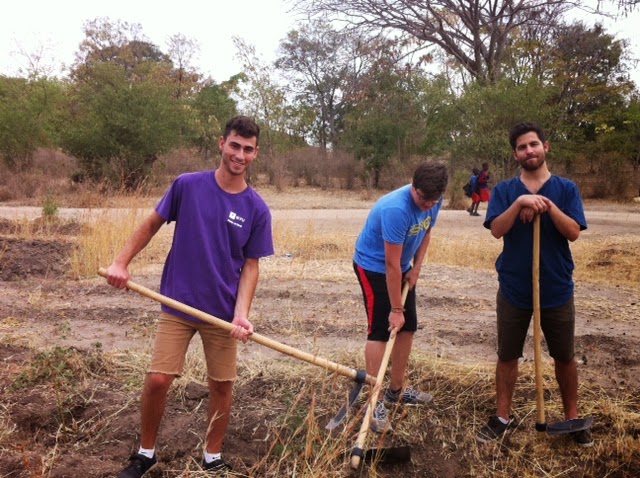 For many of the visitors we have each year at JBFC, especially our high school groups, two things are an essential part of their JBFC experience: permaculture and ugali.
For many of the visitors we have each year at JBFC, especially our high school groups, two things are an essential part of their JBFC experience: permaculture and ugali. Most of our guests spend time helping us improve the JBFC Farm by implementing permaculture design, which utilizes a variety of crops and land management techniques to capture as much water as possible and improve soil quality. They dig holes for various types of trees, plant annual alley crops, and participate in one or more discussions about how permaculture is impacting JBFC and the surrounding community.
 Similarly, most of our guests try ugali, a starchy, bland, filler-food that is a staple all across Tanzania. They try it once and for many, only once - the general consensus is that it is not very good (imagine a flavor-less play dough). However, many guests leave JBFC not necessarily understanding why we are working so hard to implement our permaculture projects and how these projects will hopefully lead to the extinction of the fan-favored ugali.
Similarly, most of our guests try ugali, a starchy, bland, filler-food that is a staple all across Tanzania. They try it once and for many, only once - the general consensus is that it is not very good (imagine a flavor-less play dough). However, many guests leave JBFC not necessarily understanding why we are working so hard to implement our permaculture projects and how these projects will hopefully lead to the extinction of the fan-favored ugali.
For the past two years JBFC has been working with permaculture guru, Mark Shepard, and the Oppenheimer family to make our agriculture on campus more self-sustaining and to hopefully improve the local community’s understanding of sustainable, long-term agricultural practices.
The benefits for JBFC are clear:
- Reduce our reliance on market-bought goods.
- Increase the caloric productivity of our farm land.
- Diversify food, plant and animal life.
- Prevent erosion and improve the general health of our soil
- Maximize energy production and storage (through photosynthesis)
- Increase our ability to store water (and reduce water usage) in an arid African climate
- Help improve the agricultural practices used by local farmers in our community, who traditionally have over-relied on staples such as rice, beans, and corn to feed their communities. And these are the crops that can deplete their farm land of useful nutrients, making it harder to match crop yields the following year.
All of this while also helping JBFC to become more self-sustaining (see also Chris’s blog about JBFC switching to solar power).
What does this all look like for JBFC and what does it mean for our old friend, Ugali?
On average, we are now serving our residential girls and staff roughly 120 servings of eggplant, zucchini, or greens every week directly from our farm (these vegetables usual come with rice or another side). At school, we serve an average of 300 servings (also usually eggplant, zucchini, or greens) to our students and school staff per week.
Our guests this year have gotten to help make, and then enjoy, the sweet and sour passion fruit juice that our girls regularly enjoy. Yonga and Bhoke can often be found sneaking off to climb one fruit tree or another in search of an afternoon snack.
On any given week our farm is now producing between 80 and 120 kilograms (176 and 220 pounds) of food- a consistent combination of passion fruit, papaya, sweet potatoes, sweet bananas, plantains, pomegranate, cucumber, onions, tomatoes, white eggplant, okra, comfrey (a perennial green), cabbage, and mchicha (a local baby spinach).
What does this mean in our fight against Ugali (and hunger)?
For every kilo of fresh, delicious, nutritious fruits and vegetables that come from our farm, we reduce our intake of ugali. This week we are adding a new weapon to our arsenal of anti-ugali tactics: breadfruit. Breadfruit is a starchy, green fruit that can reach the size of a grapefruit that tastes sort of like a potato or fresh bread, when cooked. It's considered by many to be a hunger/poverty fighting food of the future.
 Starting yesterday, we began planting ten breadfruit trees- each of which will eventually produce 450 pounds of its nutritious fruit per year. The average breadfruit weights roughly 13 pounds and can be baked, fried, steamed, sautéed, or served raw. We hope to plant 100 breadfruit trees between now and the end of the year, in addition to the 600 banana trees that have already taken root in 2014.
Starting yesterday, we began planting ten breadfruit trees- each of which will eventually produce 450 pounds of its nutritious fruit per year. The average breadfruit weights roughly 13 pounds and can be baked, fried, steamed, sautéed, or served raw. We hope to plant 100 breadfruit trees between now and the end of the year, in addition to the 600 banana trees that have already taken root in 2014.
So, while future generations of JBFC volunteers will certainly come to learn about our permaculture projects and help us achieve our food security goals, hopefully they will be leaving the ugali experience behind.
Seth Diemond is JBFC's Campus Director and also manages JBFC's Permaculture Initiative.




